What are your plans for the end of the year? If you have a little time to yourself, you might want to try one of these suggestions from the ENTtoday editorial board members. These books cover a wide range of topics, including time management, medical research, organization, and even medical fiction.
Matthew Naunheim, MD, MBA
Four Thousand Weeks: Time Management for Mortals
Oliver Burkeman; 2023, Picador Paper
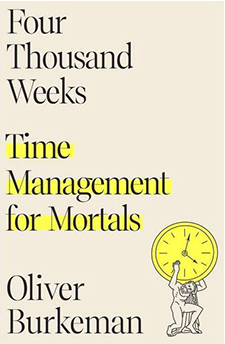 This New York Times best seller on time management takes on the familiar struggle against distraction in terms of deadlines, to-do lists, and work–life balance, but looks at it from a different angle: the challenge of how best to use the span of a human life.
This New York Times best seller on time management takes on the familiar struggle against distraction in terms of deadlines, to-do lists, and work–life balance, but looks at it from a different angle: the challenge of how best to use the span of a human life.
“The basic premise of the book is that we have only 4,000 weeks total to live—that’s the average human life span,” says Dr. Naunheim, an assistant professor in otolaryngology–head and neck surgery at Harvard Medical School and a surgeon at Massachusetts Eye and Ear in Boston. “That means 4,000 Saturdays, and 2,000 of mine are already gone even though I feel like I’m just getting started!”
Burkeman uses humor and practical insights from ancient and contemporary philosophers, psychologists, and spiritual teachers to refute the modern obsession of “getting everything done” through embracing finitude. That means highlighting that the unhelpful ways we often think about time are choices we’ve made as individuals and as a society.
“The book is about reframing your life and time,” said Dr. Naunheim. “The premise might sound a little hokey, but it’s really great.”
Timothy Smith, MD, MPH
Outlive: The Science & Art of Longevity
Peter Attia, MD; 2023, Bloomburg
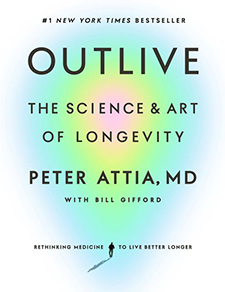 Although mainstream medicine has had many successes in healthcare, it has had challenges in making progress against diseases that kill many people, including heart disease, cancer, Alzheimer’s disease, and type 2 diabetes. Dr. Attia’s book takes a different approach to preventing chronic diseases and extending the life span.
Although mainstream medicine has had many successes in healthcare, it has had challenges in making progress against diseases that kill many people, including heart disease, cancer, Alzheimer’s disease, and type 2 diabetes. Dr. Attia’s book takes a different approach to preventing chronic diseases and extending the life span.
“It’s a health optimization book that gets into precision medicine and how it can be used to make changes to optimize one’s ‘health span’—meaning longevity with good health,” said Dr. Smith, professor and vice chair in the department of otolaryngology–head and neck surgery at Oregon Health & Science University in Portland. “You’ll find it in the self-help category.”
That self-help comes in the form of nutritional interventions, lessons on optimizing exercise and sleep, and ways to address emotional and mental health. In the book, Dr. Attia states that in order to extend longevity, actions must be personalized and people must be proactive rather than waiting to see what results might follow from faulty strategies.
Stacey T. Grey, MD
The Covenant of Water
Abraham Verghese; 2023, Grove Press UK
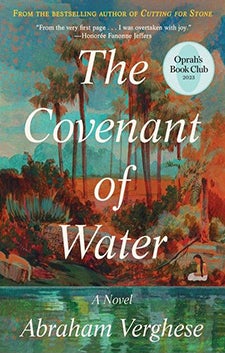 Dr. Grey, director of the sinus center and vice chair of otolaryngology education at Massachusetts Eye and Ear in Boston, loved this author’s previous book Cutting for Stone, so she was eager to read his new novel.
Dr. Grey, director of the sinus center and vice chair of otolaryngology education at Massachusetts Eye and Ear in Boston, loved this author’s previous book Cutting for Stone, so she was eager to read his new novel.
Spanning the years 1900 to 1977, The Covenant of Water follows a family in southern India: A 12-year-old girl, grieving the death of her father, is sent by boat to her wedding, where she will meet her 40-year-old husband for the first time. The book follows the life span of the young girl and future matriarch through the changes, struggles, and joys of her extraordinary life. Filled with humor and deep emotion, The Covenant of Water was chosen as an Oprah Book Club selection for 2023.
What Dr. Grey wasn’t expecting was that the book centers on a family with vestibular schwannoma (VS).
Verghese is a physician, so most of his books are factually correct enough to be satisfying! — Stacy T. Grey, MD
“It was an enjoyable read,” she said. “I had no idea it was about VS; it unfolded in the story. It was presented as a mysterious condition that afflicted a family over several generations before a family member became a physician and identified the cause. Verghese is a physician, so most of his books are factually correct enough to be satisfying!”
Cristina Cabrera-Muffly, MD
Random Acts of Medicine: The Hidden Forces That Sway Doctors, Impact Patients, and Shape Our Health
Anupam B. Jena, MD, PhD, and Christopher Worsham, MD; 2023, Doubleday
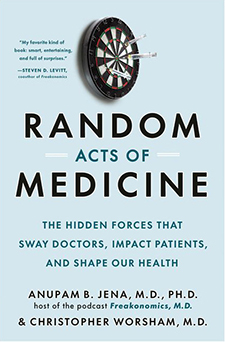 How much do timing, circumstance, and luck impact healthcare? According to the authors, events like these can have a profound effect.
How much do timing, circumstance, and luck impact healthcare? According to the authors, events like these can have a profound effect.
Random Acts of Medicine uses ingenious natural experiments—random events that unknowingly turn people into experimental subjects—to answer health questions such as, “Is there ever a good time to have a heart attack?” and “Why do kids born in the summer get diagnosed more often with ADHD?”
I also loved the part where it recommended seeing an older surgeon (their technical skills get better with age) but a younger primary care physician (they have a more current knowledge base). — Cristina Cabrera-Muffly, MD
“The data for natural experiments are very convincing,” said Dr. Cabrera-Muffly, who is the residency program director at the University of Colorado Anschutz in Aurora. “For example, for the ADHD question, the authors noticed that most well child visits are done the month of a child’s birthday. There’s a big difference between a child born in September who’s 5 when they start kindergarten compared to one whose birthday is in November who’s 5 and 10 months when they start kindergarten. Kids with summer birthdays are a lot younger than their peers and, therefore, have more trouble concentrating. I also loved the part where it recommended seeing an older surgeon (their technical skills get better with age) but a younger primary care physician (they have a more current knowledge base).”
Lisa Ishii, MD
Hidden Potential: The Science of Achieving Greater Things
Adam Grant; 2023, Viking
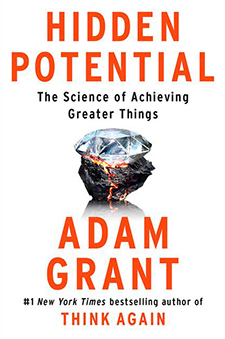 This book from an organizational psychologist at the Wharton School of the University of Pennsylvania focuses not on raw talent, but on the process of improving itself. Certainly, we admire those who have innate talents at sports, acting, music, and more, but according to Grant, that tends to make us overlook the progress we could be making in our own lives and how good we might become at our own skill set.
This book from an organizational psychologist at the Wharton School of the University of Pennsylvania focuses not on raw talent, but on the process of improving itself. Certainly, we admire those who have innate talents at sports, acting, music, and more, but according to Grant, that tends to make us overlook the progress we could be making in our own lives and how good we might become at our own skill set.
The book uses storytelling vignettes to show that progress depends on how well a person learns rather than on how hard they work. Grant also places a focus on designing systems that create opportunities for others who’ve been underrated and overlooked.
“I’m a fan of Adam Grant’s podcast ‘Work Life,’” said Dr. Ishii, who’s senior vice president of operations at Johns Hopkins Health System in Maryland. “I think the most important point it made is that ‘natural talent’ isn’t the key to success; rather, it’s nurturing and growing and learning to achieve success.”
Amy E. Hamaker is the editor of ENTtoday.
